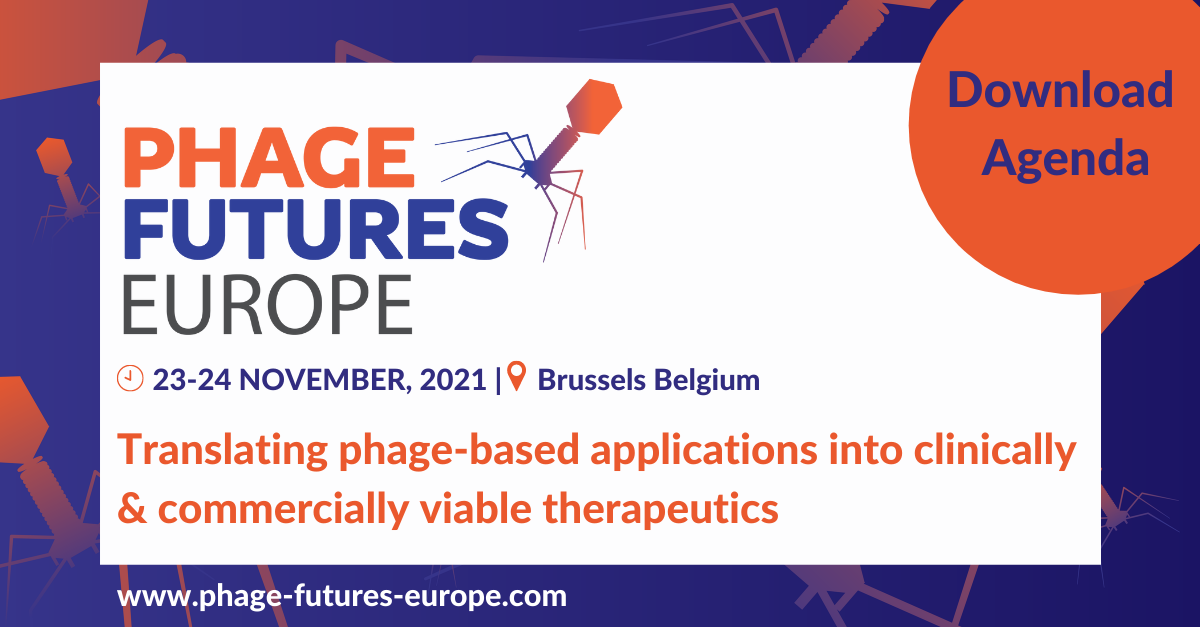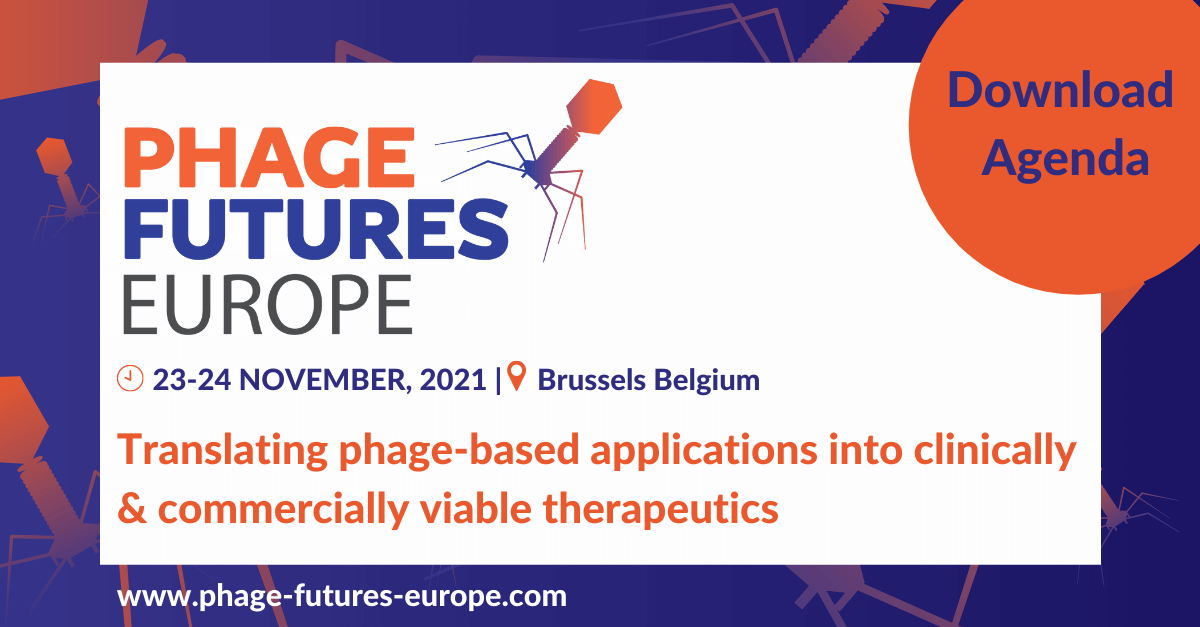This week, Kyle Jackson, a PhD student at McMaster University, brings us an interview piece featuring Michael Graham, Chief Financial Officer at Cytophage, and Assaf Oron, Chief Business Officer at BiomX. He sat down with each to talk about some of the work these companies are doing to commercialize phage therapy, which they will be presenting at the upcoming Phage Futures Europe conference in Brussels, Belgium.
You can also read this article on the Phage Futures Europe 2021 website here!

Michael Graham is Chief Financial Officer at Cytophage, which is developing technology that can generate any type of phage in the lab, replacing that ‘search-in-nature’ process and accelerating the development and application of phages to prevent or treat infections.

Assaf Oron is Chief Business Officer at BiomX, which is developing natural and engineered phage cocktails designed to target and destroy bacteria that affect the appearance of skin as well as chronic diseases such as cystic fibrosis, inflammatory bowel disease, atopic dermatitis and colorectal cancer.
“With multiple companies developing phage therapies and several upcoming clinical studies, the likelihood of delivering viable phage-based therapies to the industry is higher than ever before” — Assaf Oron, Chief Business Officer, BiomX
Prior to the COVID-19 pandemic, the World Health Organization estimated that by 2050, approximately 10 million people would die annually due to antimicrobial resistant (AMR) infections. During the pandemic, reports indicated staggering misuse of antibiotics by physicians and patients alike thinking it would be able to treat COVID-19 infections. This further misuse over the last two years is expected to exacerbate the established AMR crisis and reinforces the need for novel solutions.
Phage Futures Europe 2021 is slated to kick off on November 23rd and will bring together leaders in academia, regulatory, and industry to discuss the future of bacteriophages in a world where commonly used antibiotics are becoming less and less effective. The conference’s theme this year focuses on translational bacteriophage research and the commercialization of phage-based therapeutics.
The global market for phage-based companies has grown exponentially in recent decades. These companies are designing novel strategies to alleviate the burden society has placed on conventional antibiotics.
Cytophage is a synthetic biology phage-based company out of Winnipeg, Canada. Dr. Steven Theriault, Cytophage’s Chief Executive Officer, will be presenting at Phage Futures Europe on their innovative technology and its impact in Canada’s agricultural sector. Cytophage was the winner of the 2018 Nutreco Feed Tech Challenge and was the recipient of the TechConnect 2019 Defense Innovation Award. They are a leader in developing targeted treatment strategies to minimize antibiotic usage in livestock, or in the case of the Canadian market, fill an immediate need due to antibiotic usage being banned.
“A lot of questions [concerning the commercialization of phage] are how do you make them widely available? How do you make them cost effective? How do you improve their therapeutic outcome?” explains Michael Graham, Cytophage’s Chief Financial Officer. “Our whole technology is [about] overcoming the inherent weaknesses of natural phages.”
Natural phages present many commercial opportunities for companies, whether that be in the therapeutic, diagnostic, or even agricultural spaces. But there are key disadvantages to natural phages that investors simply cannot overlook.
“Some natural phages have an incredible shelf life, and some have a very poor shelf life. Unfortunately, when you’re looking for natural phages, you’re hoping to find that needle in a haystack that doesn’t have toxic genes, isn’t lysogenic, has to be shelf stable, and has to target your bacterium [of interest].” — Michael Graham, Chief Financial Officer, Cytophage
These are the key traits that need to be considered when companies are designing products based on phages. If you took the conventional approach of trying to find natural phages (i.e., a “Phage Hunt” – screening environmental samples against your target bacteria), it could take a while!
“There are 14 serotypes of E. coli that we target, and if you looked for natural phages, you would likely need 14 different phages in a single product to target that collection of bacteria. Meaning you would need to replicate a phage hunt 14 times, which is obviously extremely expensive and time-consuming.” says Graham. “Finding 14 different phages [that overcome those aforementioned barriers] would be a miracle.”
In response to these barriers, Cytophage has developed their core platform around the idea of modifying their phages to express desirable traits that minimize, or even eliminate, deleterious off target effects (resistance, lack of phage infectivity in vivo, etc.).
“We developed a platform where we start with a [base] phage with entrenched properties and are able to extend the host range [of the modified phage] and change the binding domain so that [the modified phage] binds more serotypes of the same species.”
Separately from expanding the host range specificities, Cytophage is able to remove certain genes from the phage, thereby preventing the incorporation of its genome into the host cell, which could lead to lysogeny and resistance. Ultimately, this level of modification to the phage is expected to significantly reduce the inevitable phage resistance that is often cited as a barrier to phage therapy adoption.
“If the phages bind, they kill. We are also able to predict mutants from those phage-bacterial interactions and can mitigate those risks of resistance” explains Graham.
Using these modified phages, Cytophage has managed to develop patented products that are able to target a wide variety of bacterial species including Escherichia coli, Salmonella, Clostridium perfringens, among others. They are hoping to have these products approved for commercial use, with specific focus on agricultural applications, in the near future.
According to Graham, at Phage Futures Europe 2021, you can expect to hear Dr. Steven Theriault, Cytophage’s Chief Executive Officer, talk about the exciting trial results that have been obtained from testing their cocktail solutions on poultry. You can also expect to hear future goals and targeted treatments from this Canadian synthetic biology company.
Aside from the agricultural implications of phages, the most common application people tend to gravitate towards is phage therapy in a medical context. Although much attention has been placed on finding solutions for acute infections, many phage-based companies have begun pivoting to treat chronic infections.
“Our focus is targeting chronic conditions” says Assaf Oron, Chief Business Officer at BiomX – an Israel-based clinical-stage phage therapy company – and speaker at this year’s Phage Futures Europe conference. “Our pipeline consists of multiple indications including acne, atopic dermatitis, inflammatory bowel disease (IBD) and cystic fibrosis.”
Last year BiomX had positive results from a phase 1 cosmetic clinical study where they used a proprietary phage cocktail, BX001, to target Cutibacterium acnes. They are expecting results from their follow-up phase 2 cosmetic clinical study in the coming weeks.
Additionally, BiomX wrapped up a successful phase 1a clinical study evaluating the pharmokinetics of BX002, an additional phage cocktail, in healthy volunteers, with the ultimate goal of treating potential pathogenic bacteria residing in the gut that may play a role in the onset and exacerbation of IBD.
“We hope to begin moving into larger phase 1/2 trials next year in IBD, cystic fibrosis and atopic dermatitis, so we expect this to be an exciting year” describes Oron. “We look forward to sharing these exciting results at Phage Futures Europe”.
BiomX is a global leader in phage therapy applications. Since their inception, they have been working strategically with hospitals and universities to advance phages’ clinical adoption and make it more accessible to the general public; a focal point of their message for Phage Futures Europe 2021.
“Phages were discovered a hundred years ago, and often people ask why we haven’t seen any phage-based therapies yet. What people need to know is that today there is both technological maturity and a growing unmet need, with increasing resistance to antibiotics, that could allow this new modality to become viable”.
When it comes to using phages as therapeutic tools, concerns regarding the patentability of phage therapy have historically been raised as a barrier to its adoption. However, Oron sheds an optimistic light here, explaining some of the ways BiomX has navigated this:
“We have been building a growing intellectual property portfolio to protect our phage cocktails”, explains Oron, “1) we sometimes apply synthetic biology, which allows a new composition of matter, and 2) all of our products are combinations, or cocktails, of phage, which have unique complementary properties that could be protected very similarly to the approach taken by microbiome companies developing products based on consortiums of natural bacteria, which build a patent portfolio to protect those combinations. Many of these principles also apply to our phage cocktails”.
BiomX holds patents for many of their phage products in major markets around the world including the United States, China, Canada, the European Union, and Australia.
“We’ve invested millions of dollars into developing phage assays and computational tools to optimize our phage cocktails to have complementary features such as host range, addressing resistance and biofilm penetration. These capabilities have also helped make our patent claims stronger.”
To hear more about how Cytophage, BiomX, and dozens of other key leaders in the phage field are moving toward translation of phage research and technologies, check out this year’s Phage Futures Europe Conference!
This issue was produced in collaboration with Kisaco Research to promote their upcoming Phage Futures Europe 2021 event.
Phage Futures Europe (Nov 23-24, 2021 in Brussels, Belgium — in person!) will bring together biotech, pharma, academia and governmental bodies to help move phage therapy forward into clinically and commercially viable therapeutics.
Grab your ticket for the conference, where Assaf Oron (CBO, BiomX) and Steven Theriault (CEO, Cytophage) and many more phage biotech professionals will give an overview of the latest progressions in the clinical landscape for phage-based application!
For a 10% discount, enter code PD10 at checkout!

Many thanks to Atif Khan and Stephanie Lynch for finding and summarizing this week’s phage news, jobs and community posts!









